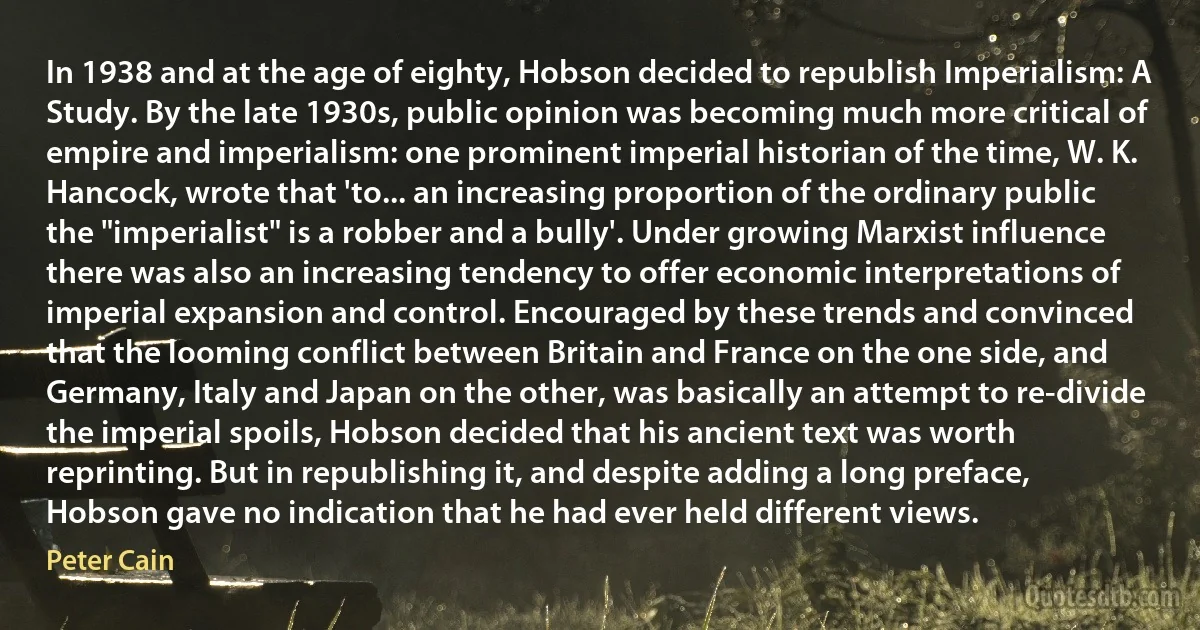
In 1938 and at the age of eighty, Hobson decided to republish Imperialism: A Study. By the late 1930s, public opinion was becoming much more critical of empire and imperialism: one prominent imperial historian of the time, W. K. Hancock, wrote that 'to... an increasing proportion of the ordinary public the "imperialist" is a robber and a bully'. Under growing Marxist influence there was also an increasing tendency to offer economic interpretations of imperial expansion and control. Encouraged by these trends and convinced that the looming conflict between Britain and France on the one side, and Germany, Italy and Japan on the other, was basically an attempt to re-divide the imperial spoils, Hobson decided that his ancient text was worth reprinting. But in republishing it, and despite adding a long preface, Hobson gave no indication that he had ever held different views.
Peter CainRelated topics
age attempt becoming control different expansion growing historian hold imperial imperialism imperialist increasing japan late looming offer opinion preface public side study tendency text time under worth 1930s marxist hancock britain spoilsRelated quotes
... a rather different class of applications of the idea of best allocation of scarce resources... usually referred to as the theory of optimal economic growth. In most studies of this kind made in the countries with market economies there is not an identifiable client to whom the findings are submitted as policy recommendations. Nor is there an obvious choice of objective function, such as cost minimization or profit maximization in the studies addressed to individual enterprises. The field has more of a speculative character. The models studied usually contain only a few highly aggregated variables. One considers alternative objective functions that incorporate or emphasize various strands of ethical, political, or social thought. These objectives are then tried out to see what future paths of the economy they imply under equally simplified assumptions of technology or resource availability.

Tjalling Koopmans
In a capitalist democracy there are essentially two methods by which social choices can be made: voting, typically used to make ‘political' decisions, and the market mechanism, typically used to make ‘economic' decisions. In the emerging democracies with mixed economic systems Great Britain, France, and Scandinavia, the same two modes of making social choices prevail, though more scope is given to the method of voting and to decisions based directly or indirectly on it and less to the rule of the price mechanism. Elsewhere in the world, and even in smaller social units within the democracies, the social decisions are sometimes made by single individuals or small groups and sometimes (more and more rarely in this modern world) by a widely encompassing set of traditional rules for making the social choice in any given situation, for example, a religious code.

Kenneth Arrow
...But no matter how enamoured one may be with Postmodernist instability of meanings and signification slippage, absolutely nothing can make spinozisme as employed in Diderot's Promenade and the Encyclopédie, or in High Enlightenment literature, compatible with Revelation, divine providence, religious authority, theism, mysticism, fideism, eclecticism, moral relativism, Aristotelian substances, Platonic ideals, Prisca theologia (natural religion), Cartesian dualism, Lockean dualism based on supra rationem, double truth, fixity of species, Epicurean swerves, La Mettrie's materialism, or skepticism. ‘Spinozists' a term already in very wide use, in Britain, Germany, France, and Italy, as well as Holland well before 1700, and ‘spinozisme' as used in eighteenth-century France, can never mean, or ever be blended with, any of these trends. It may not always be a rigorous philosophical-theological category.

Baruch Spinoza
One thing we have endeavoured to observe most scrupulously, namely, never to depart from the strictest facts and, in dealing with the difficult questions that have arisen during the year, we hope that we have used the utmost moderation possible under the circumstances. Our duty is very simple and plain. We want to serve the community, and in our own humble way to serve the Empire. We believe in the righteousness of the cause, which it is our privilege to espouse. We have an abiding faith in the mercy of the Almighty God, and we have firm faith in the British Constitution. That being so, we should fail in our duty if we wrote anything with a view to hurt. Facts we would always place before our readers, whether they are palatable or not, and it is by placing them constantly before the public in their nakedness that the misunderstanding between the two communities in South Africa can be removed.

Mahatma Gandhi
I am presently at work on a dissertation dealing with the theory of international trade and foreign exchange rates. In dealing with this, studies of the intervention of recent years in the area of trade and exchange rates of different countries is of the greatest importance. I therefore hope to be able to begin a six month study tour to Switzerland, France and England at the end of May this year. After having collected the necessary material I intend - if the economic side can be arranged - during a stay of 6–12 months in England (probably Cambridge) or possibly the United States (in that case probably Harvard University) - to work out the above mentioned dissertation as a specimen for the doctoral degree in philosophy and pursue studies in general. I have not yet any detailed study plan. That should appropriately be set up after the arrival.

Bertil Ohlin
